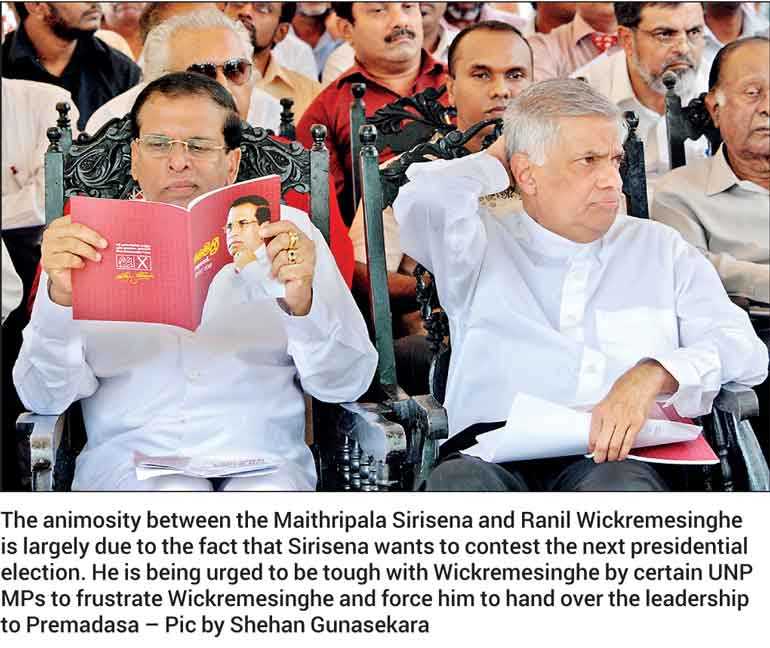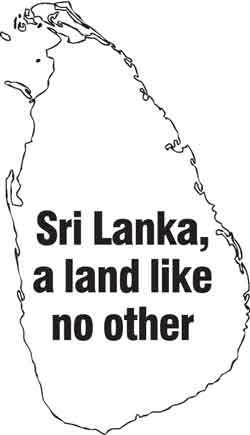Tuesday Feb 24, 2026
Tuesday Feb 24, 2026
Saturday, 8 December 2018 00:10 - - {{hitsCtrl.values.hits}}

By Our Special Political Correspondent
It is now nearly one week since Mahinda Rajapaksa and his Government was forced to stand down by Court. The interim order issued by the Court of Appeal prevented purported Prime Minister Mahinda Rajapaksa and his Government from functioning in office. President Maithripala Sirisena likened the decision to a head monk of a village temple dictating terms to the chief prelate of a chapter. "ksldhl uydkdhl flfkla lrkak ´k jevla, úydrdêm;s flfkla foaYkd lr,d," he said in Sinhala reinforcing his ignorance of the law.
The petition against Rajapaksa’s dismissal is yet to be heard. The President must know his powers are limited in the system of checks and balances in the Constitution. As the leader of the Executive branch, the President ensures the enforcement of the laws of the country. In order to limit the powers of the President, Parliament must approve the people chosen to fill these jobs and its expenses.
Ironically, the country has so far, now over a week, run well without any ministers or a prime minister by the ministry secretaries. Given the huge costs involved in running a government that hardly adds any value to society other than politicians and their families growing their waistline, the time has come to challenge the current system. Why have them at all?
The public should start a discourse about the type of government they wish to have to take this country forward. For example the Chief Executive of Hong Kong is chosen by an Election Committee of 1,200 members who are mainly elected from small professional sectors and pro-Chinese business groups in Hong Kong. The Hong Kong GDP is nearly five times of ours.
Animosity
The second round of discussions between President Sirisena and the United National Front party leaders ended unsuccessfully on Monday with the President continuing to reject the UNF’s nomination for the prime minister’s position.
Wickremesinghe is the UNF’s nominee for the prime minister post, and has the support of 117 MPs in the House. Despite their hardline, Sirisena said he would not reappoint Wickremesinghe as the prime minister, bringing the political crisis back to square one. Technically he has no right to do so.
Speaking at the SLFP convention the President once again berated the four-time Prime Minister. A few days Wickremesinghe had his say at an event at Galle Face Hotel. He said that it is the pan (thachchiya) speaking and that everybody got together to make a hopper.
 “We hoped for democracy, development and reconciliation. The events that took place since 26 October have kept us wondering about what our elected representative is up to. We commenced this journey to instil a society where we could live peacefully. People started to become active on social media and to fight for democracy. People participated in our rallies. With that we can be happy that we have strengthened democracy over the past three years. We established procedures to elect officials to office. We were able to allow institutions to function independently,” Wickremesinghe said.
“We hoped for democracy, development and reconciliation. The events that took place since 26 October have kept us wondering about what our elected representative is up to. We commenced this journey to instil a society where we could live peacefully. People started to become active on social media and to fight for democracy. People participated in our rallies. With that we can be happy that we have strengthened democracy over the past three years. We established procedures to elect officials to office. We were able to allow institutions to function independently,” Wickremesinghe said.
He further said that this has nothing to do with a Viharadipathi or a Maha Nayaka, but it is an issue with the Vinaya Pitaka in reference to the Constitution. “The country is governed by the Government and not the Executive. We have to take action against those who are violating the principles of the Constitution. We also have to abolish the Executive powers of the President.”
The private sector chambers too met the President on Monday led by the Ceylon Chamber of Commerce to express their concerns. In a strongly-worded memo they stated that the private sector position is that the highest priority should be given to the national interest and that the political leadership must refrain from pursuing any path that will result in an economic downfall which will have an adverse impact on the country and ultimately, the people.
Therefore they said the conduct of the elected representatives should be within the remits of democratic processes and institutions so as to reinstall a semblance of confidence that stability can be regained. It is imperative, they noted, that the present political impasse is swiftly resolved and that a repetition of this kind of situation which is so detrimental to the country is avoided.
Verdict
The Supreme Court verdict is due to be given today, Saturday, 8 December. The verdict will either confirm the constitutionality and legitimacy of President Sirisena’s decision to dissolve Parliament or reject the decision as an illegitimate decision that violates the Constitution.
If the decision goes in favour of Sirisena, in effect it will also be a decision in favour of Mahinda Rajapaksa. Such a decision is likely to have many consequences. The dissolution of Parliament at this juncture is not a victory for “people’s sovereignty” or democracy as some would claim.
People’s sovereignty is protected when governance accords with the rule of law. Arbitrary action, in this instance the sudden holding of elections by the Executive to suit his narrow political goals, is not a triumph for people’s sovereignty or democracy. It is misguided patriotism.
Sri Lanka’s 90-year-old democracy belongs to a more genuine tradition of democracy and to the people of Sri Lanka and it would be a great tragedy if that noble tradition were to be abandoned starting with this crisis.